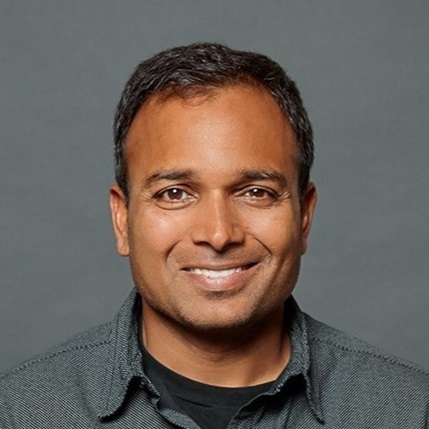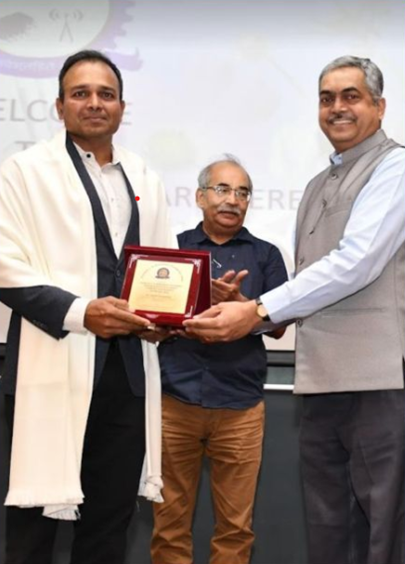Suresh Gurunathan: Pioneering Frontiers in Biomedical Innovation and Entrepreneurship

Mr. Suresh Gurunathan graduated from BITS Pilani (Pilani, ’89), where he pursued a dual degree in Biological Sciences and Electrical and Electronics Engineering. He pursued an MS in Biomedical Engineering from Virginia Commonwealth University (School of Medicine) and an MBA from the Wharton School. His work at Abbott contributed to the creation of Aveir™ Leadless Pacemaker, a revolutionary innovation in the pacemakers world. He has worked on many start-ups like Neuropace Inc. and Nanostim Inc. and is currently the Co-founder and CEO of a medical device start-up. He was recently honored with the Professor L.K. Maheshwari Distinguished Alumnus Award at his alma mater, BITS Pilani.
How did being the captain of the BITS field hockey team, a member of the powerlifting team, and a coordinator for the Department of Biological Sciences exhibition during APOGEE shape your approach to life?
I had played field hockey in high school and decided to continue it over at BITS, while powerlifting was something that I ended up participating in since I enjoy weightlifting. I like mixing sports with studies; it helps me maintain my sanity. As for APOGEE, my batch in biology was quite a small group, with only 12 people in my class, so they required help for their exhibition. I helped them for one year and became the coordinator for one term. It helped shape my leadership skills: organizing, coordinating, and leading people, whether a field hockey team or an event like BOSM or APOGEE.
What made you interested in the field of Biomedical Engineering and medical devices, and did you ever consider an alternative path?
After graduating from high school, I got into top engineering colleges in South India but followed a friend of mine to BITS, where I pursued a dual in Bio and EEE. For my Master’s, I chose Biomedical Engineering, which fascinatingly was an amalgamation of both my degrees. I found the research during my Master’s degree extremely interesting and decided to build my career designing innovative medical devices.
Your work at Abbott on the breakthrough technology Aveir™, the world's first pair of pacemakers with zero wires is truly remarkable. What are some challenges you face in the process of designing such medical devices?
A traditional pacemaker has wires (also known as leads) that connect the pacemaker to the patient’s heart to help with pacing, but there are quite a few drawbacks with this product, infection being one of them. The leadless pacemaker concept is to build a small enough pacemaker to fit inside the patient’s heart. There were a lot of technical challenges we had to overcome with this novel device. Firstly, how is the pacemaker going to fit inside the heart? It should be pretty small and sturdy but, simultaneously, removable after it expires and has a good battery life. Secondly, how will we communicate with the device without the leads? The culmination of our work on such problems created Aveir™ leadless pacemakers.

Besides Biomedical Engineering, you have a passion for construction and land development. What made you take this parallel path of building high-end homes?
My wife and I decided to buy a rundown house (commonly known as a fixer-upper) in a great neighborhood in Palo Alto, California, and then renovate it ourselves. With the help of some of my BITSian friends, I worked on remodeling this house. I enjoyed the work immensely, and this city's great real estate market made me realize this potential as a side business. I got my license as a contractor and started a construction business building new houses from the ground up. I look forward to working on more such projects.
Do you have any advice for someone considering a career in your field?
During my time, most engineers from different branches would switch over to Electrical or Computer Science Engineering at some point to gain a stable career. However, things have seemingly changed now, including in India. People who follow their passion can also pursue a promising, fulfilling career. I ended up working in Biomedical Engineering and am glad I picked up this career. I think it is about realizing your passion and sticking to it and not primarily chasing the money, which will come eventually.
You Might Also Like
- BITS to Baker Hughes: Shad Hussain’s Journey Through Turbulent Times
- Be Cool: Navigating Life, Literature, and Mental Health with Shashi Warrier
- Coaching Across Cultures: Brajesh Bajpai’s Journey of Learning, Leading, and Adapting
- From Engineer to AI Leader: An Interview with Akhil Singhal on Startups, Strategy, and the Future of Gen A
- From Circuits to Capital Markets: Deepak Joshi’s Global Finance Journey














